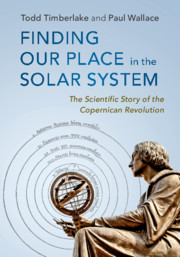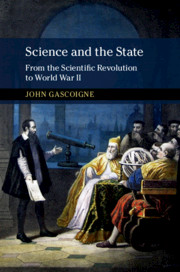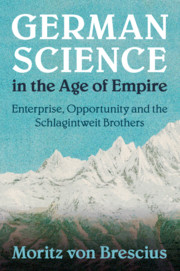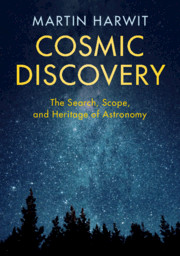Refine search
Actions for selected content:
13588 results in History of science and technology
2 - The Renaissance Monarchy
-
- Book:
- Science and the State
- Published online:
- 11 March 2019
- Print publication:
- 21 March 2019, pp 11-30
-
- Chapter
- Export citation
5 - The Fringes of Legitimacy—The Need for Enlightened Planning
-
- Book:
- Cosmic Discovery
- Published online:
- 01 March 2019
- Print publication:
- 21 March 2019, pp 232-294
-
- Chapter
- Export citation
Appendix B - Information, Capacity, and Information Rates
- from Appendices
-
- Book:
- Cosmic Discovery
- Published online:
- 01 March 2019
- Print publication:
- 21 March 2019, pp 303-306
-
- Chapter
- Export citation
6 - Contested Exploration and the Indian Rebellion: The Fateful Year 1857
-
- Book:
- German Science in the Age of Empire
- Published online:
- 01 March 2019
- Print publication:
- 21 March 2019, pp 217-254
-
- Chapter
- Export citation

Finding our Place in the Solar System
- The Scientific Story of the Copernican Revolution
-
- Published online:
- 18 March 2019
- Print publication:
- 28 March 2019

Science and the State
- From the Scientific Revolution to World War II
-
- Published online:
- 11 March 2019
- Print publication:
- 21 March 2019

German Science in the Age of Empire
- Enterprise, Opportunity and the Schlagintweit Brothers
-
- Published online:
- 01 March 2019
- Print publication:
- 21 March 2019

Cosmic Discovery
- The Search, Scope, and Heritage of Astronomy
-
- Published online:
- 01 March 2019
- Print publication:
- 21 March 2019
Charles Morris Lansley, Charles Darwin's Debt to the Romantics: How Alexander von Humboldt, Goethe and Wordsworth Helped Shape Darwin's View of Nature. Oxford: Peter Lang, 2018. Pp. 273. ISBN 978-1-78707-138-4. £60.00/$90.95 (hardback)
-
- Journal:
- The British Journal for the History of Science / Volume 52 / Issue 1 / March 2019
- Published online by Cambridge University Press:
- 05 March 2019, pp. 170-171
- Print publication:
- March 2019
-
- Article
- Export citation
ARA relief campaign in the Volga region, Jewish anthropometric statistics, and the scientific promise of integration
-
- Journal:
- Science in Context / Volume 32 / Issue 1 / March 2019
- Published online by Cambridge University Press:
- 24 May 2019, pp. 5-24
- Print publication:
- March 2019
-
- Article
- Export citation
Giving Tshuve to the sick: correspondence columns of the Yiddish medical press in Poland
-
- Journal:
- Science in Context / Volume 32 / Issue 1 / March 2019
- Published online by Cambridge University Press:
- 24 May 2019, pp. 25-41
- Print publication:
- March 2019
-
- Article
- Export citation
Carin Berkowitz and Bernard Lightman (eds.), Science Museums in Transition: Cultures of Display in Nineteenth-Century Britain and America. Pittsburgh, PA: University of Pittsburgh Press, 2017. Pp. xi + 375. ISBN 978-0-8229-4475-1. $45.00 (hardcover).
-
- Journal:
- The British Journal for the History of Science / Volume 52 / Issue 1 / March 2019
- Published online by Cambridge University Press:
- 05 March 2019, pp. 168-170
- Print publication:
- March 2019
-
- Article
- Export citation
Scientific Medicine and the Politics of Public Health: Minorities in Interwar Eastern Europe
-
- Journal:
- Science in Context / Volume 32 / Issue 1 / March 2019
- Published online by Cambridge University Press:
- 24 May 2019, pp. 1-4
- Print publication:
- March 2019
-
- Article
- Export citation
BJH volume 52 issue 1 Cover and Front matter
-
- Journal:
- The British Journal for the History of Science / Volume 52 / Issue 1 / March 2019
- Published online by Cambridge University Press:
- 05 March 2019, pp. f1-f2
- Print publication:
- March 2019
-
- Article
-
- You have access
- Export citation
Jaume Navarro (ed.), Ether and Modernity: The Recalcitrance of an Epistemic Object in the Early Twentieth Century. Oxford: Oxford University Press, 2018. Pp. 272. ISBN 978-0-1987-9725-8. £65.00 (hardcover).
-
- Journal:
- The British Journal for the History of Science / Volume 52 / Issue 1 / March 2019
- Published online by Cambridge University Press:
- 05 March 2019, pp. 173-174
- Print publication:
- March 2019
-
- Article
- Export citation
Ben A. Minteer, Jane Maienschein and James P. Collins (eds.), The Ark and Beyond: The Evolution of Zoo and Aquarium Conservation. Chicago and London: The University of Chicago Press, 2018. Pp. xiv + 454. ISBN 978-0-226-538446-4. $35.00 (paperback).
-
- Journal:
- The British Journal for the History of Science / Volume 52 / Issue 1 / March 2019
- Published online by Cambridge University Press:
- 05 March 2019, pp. 180-181
- Print publication:
- March 2019
-
- Article
- Export citation
SIC volume 32 issue 1 Cover and Front matter
-
- Journal:
- Science in Context / Volume 32 / Issue 1 / March 2019
- Published online by Cambridge University Press:
- 24 May 2019, pp. f1-f3
- Print publication:
- March 2019
-
- Article
- Export citation
Patricia Fara, A Lab of One's Own: Science and Suffrage in the First World War. Oxford: Oxford University Press, 2018. Pp. xiii + 319. ISBN 978-0-19-879-498-1. £18.99 (hardcover).
-
- Journal:
- The British Journal for the History of Science / Volume 52 / Issue 1 / March 2019
- Published online by Cambridge University Press:
- 05 March 2019, pp. 171-173
- Print publication:
- March 2019
-
- Article
- Export citation
BJH volume 52 issue 1 Cover and Back matter
-
- Journal:
- The British Journal for the History of Science / Volume 52 / Issue 1 / March 2019
- Published online by Cambridge University Press:
- 05 March 2019, pp. b1-b3
- Print publication:
- March 2019
-
- Article
-
- You have access
- Export citation
Veronika Fuechtner, Douglas E. Haynes and Ryan M. Jones (eds.), A Global History of Sexual Science 1880–1960. Oakland, CA: University of California Press, 2018. Pp. 477. ISBN 978-0-520-29339-7. $34.95 (paperback).
-
- Journal:
- The British Journal for the History of Science / Volume 52 / Issue 1 / March 2019
- Published online by Cambridge University Press:
- 05 March 2019, pp. 175-176
- Print publication:
- March 2019
-
- Article
- Export citation
